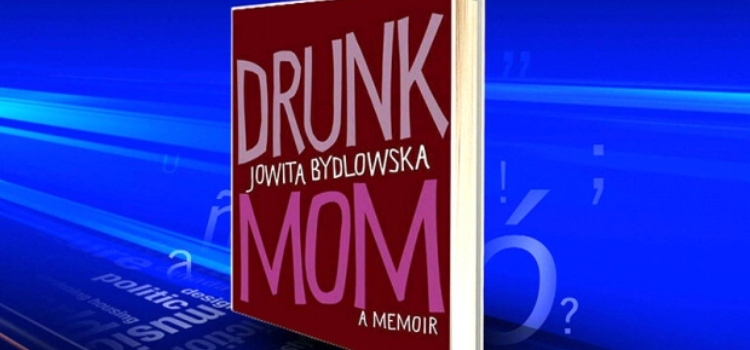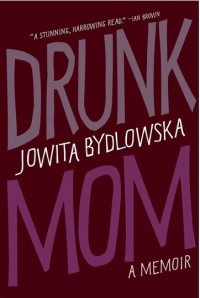Drunk Mom

Reviewed by Angie Abdou
Whoa. This book knocked the air right out of me. Drunk Mom chronicles one party girl’s head-on collision with motherhood. But Jowita Bydlowska is not your average party girl. She is a self-defined addict.
The memoir begins with Jowita, a new mother on a rare night out, finding a baggie of cocaine in a public washroom. She’s powerless to resist this temptation, and the opening twelve pages tell us where that cocaine takes her. Even in these early pages, the careful reader will begin to suspect that our dear Jowita might have an itsy-bitsy problem.
But then we read that cocaine is not, in fact, Jowita Bydlowska’s problem. Alcohol is Jowita’s problem: “I prefer drinking to anything in the world: sex, food, sleep. My child, my lover, anything. I love to drink. Sometimes I think: No, I am drink. It’s like my blood. Even before I get it, I can feel it in my veins. I’m not being poetic – I can actually feel it in my veins. It’s gold. It’s like little zaps of gold going through me, charging me, starting me up. When I drink, I fill with real gold and become god-like. So I’m not a cocaine addict. I’m a drunk.”
Jowita Bydlowska, to steal a phrase from Hemingway, writes hard and clear about what hurts. And man oh man can she write!
Let me digress for a moment to pose a question: Why should we read? My answer comes in one word: empathy. A book like Rohinton Mistry’s A Fine Balance can put me (a middle class white North American woman) into the skin of a legless homeless Indian man in the streets of Mumbai. This is a man I might have crossed the street to avoid, someone whose suffering I would think had nothing to do with me. By the end of Mistry’s book, I am him. In that way, by creating empathy, good literature can make the world a better place.
I love Drunk Mom for some of the same reasons that I love A Fine Balance. Like Mistry, Bydlowska knows how to immerse a reader fully in created experience (I use “created” deliberately – yes, Bydlowska has lived these events, but a whole lot of artistry is involved in the making of the book). This raw account of the indignities of a chronic drunk put me right in Jowita Bydlowska’s skin through some of the worst years of her life. I lived the pain of her hangovers, the weight of her guilt, the shame of each pump-and-dump, the unrelenting pull of her addiction. It’s not pretty. There is no glamour. She sits in the back of a movie theatre and drinks wine out of a box until she barfs on herself. She repeatedly hurts those who love her most. Why? “Because I wanted a drink. Because the wanting was stronger than me.” There are places in the book where readers might lose hope for her, might even hate her, but never as much as she hates herself. Drunk Mom is a memoir born of profound remorse. Jowita Bydlowska dedicates the book to her son – but she explains “This is not ‘to’ or ‘for’ Hugo but because I’m sorry, Hugo.”
It’s long after last call here and someone has done away with the mood lighting. Jowita Bydlowska takes a hard, fearless look at herself under the fluorescent lights. Her unflinching gaze and stark honesty get a standing ovation from me. Drunk Mom is a book that sticks.
In the acknowledgements, Bydlowska explains that she wrote Drunk Mom for three reasons. One is to help others who have similar struggles. Although she never claims to have the answers (“This is no self-help book,” she writes), I do think Drunk Mom will help. Reading about the binges, the blackouts, the lies, and the constant struggle for recovery, many will know they are not alone.
In my decades as a lover of books, I’ve written only two fan mails. One of them went to Jowita Bydlowska. Thank you, Jowita, for Drunk Mom – for its rawness, for its clarity, for its bravery.
 Angie Abdou is the author of several novels, including Anything Boys Can Do and The Bone Cage.
Angie Abdou is the author of several novels, including Anything Boys Can Do and The Bone Cage.
Drunk Mom, with a new cover, is available at Amazon in several different formats.

























Indeed, indeed, indeed — Now I have to pile another dead-tree book on the stack or put another ebook in the cue for the iPad.
Any source that can deepen empathy within me is something I yearn for. I’m a drunk myself, addicted to the liquid, legal drug ethyl alcohol; I’ve been sober by the “grace” of AA for over 40 years; and if not conscious, I can still be judgmental and critical of addicts, especially addicts who can’t seem to “get it.” I sometimes join those more dogmatically doctrinaire, who proclaim, “All you need to do is to DO the Big Book. Just don’t quit before the miracle.” I forget that all of us ethyl alcohol addicts, both drunk and sober, are powerless over alcohol.
I can never acquire enough empathy for addicted persons, starting with myself…
I just finished reading this book, and I’m tempted to say it’s the best alcoholic memoir I’ve ever read or, at least, that it’s the one I have felt most connected to. I am not a mother, and I have never been to rehab, but so many of her experiences resonated with me so completely because I, too, am an alcoholic.
I read a number of reviews about this book before devouring it myself over the past twenty-four hours or so, and there was one – and I can’t even remember if this was a published review or a customer review on Amazon or something – that really struck me, and that I kept in the back of my head while I was reading the book. It seemed that what this reader had mostly gotten out of the book was that Bydlowska was a hateful, selfish person who lied to everybody. Other reviews mostly praised her writing and her honesty, and they seemed shocked at many of these revelations.
I wasn’t shocked. I have sat in so many rooms and heard so many stories by now, and it takes a lot to shock me. But, again, I am an alcoholic, and sometimes I forget, because the way that I think is so ingrained and natural to me, that most people don’t think like addicts.
While reading I felt on many occasions, quite alarmingly, like getting wasted. Bydlowska reminded me of easy lies and escapes, trips to romantic cities like Montreal and strange bars, and being in my twenties. Freedom, abandon, a fleeting but awesome happiness that I know so well, that I really, really miss sometimes.
But also, and mostly, she reminded me of that obsession that I never want to have again. Measuring drinks, making sure there is enough time, a map of the city that is all liquor stores and bars and how not to be too familiar. Drunken phone conversations, speaking slowly so as not to slur my words, how hard it is to convince myself I’m being convincing. The guilt, shame, especially about not being able to just stop. Get over it.
I think it was good to be reminded of how inherently selfish addiction is. I’m not sorry that one reviewer couldn’t, actually, get it, but I wish that she or he had been able to utilize the empathy that Angie Abdou has in this review. Because what I kept thinking, reading this, was that as great as it is for me to be able to see myself in these pages, it would be greater still for people who have watched someone they love go through this, to be able to understand how this happens; to be aware of this kind of thinking. Because it’s crazy, obsessive, all-encompassing, and this is why it is so hard to stop. It is amazing any time that anyone does. This book illustrates this so well and I think it is so important.
I just finished this book and it is marvellous! So extraordinarily well written. Normally I get about a third into a book and lose interest. Not with Drunk Mom: I read it cover to cover finishing at 2:30 a.m. last night. One of the things I appreciated was Jowita’s understanding of the existential discomfort that afflicts the alcoholic. Page after page, I felt outed, exposed as a suffering, blithering and incorrigible alcoholic, as though someone were telling the story of my alcoholism. And praise Jowita for not preaching; it is the perfect memoir, not a self-help book but a self-portrait. For anyone who has lived or is living through their own alcoholism or the alcoholism of someone close to them, and wants to better understand the affliction, this is a must-read. Thank you, Jowita.
Jowita’s book reads like a subway ride to the end of the line… and still missing our stop until it is finished. I became as self absorbed in the journey as she was herself.
This is a must read for any alcoholic/addict parent.
I am blown away by her clarity and honest dishonesty… it will be a loaner to people I know in search of themselves.